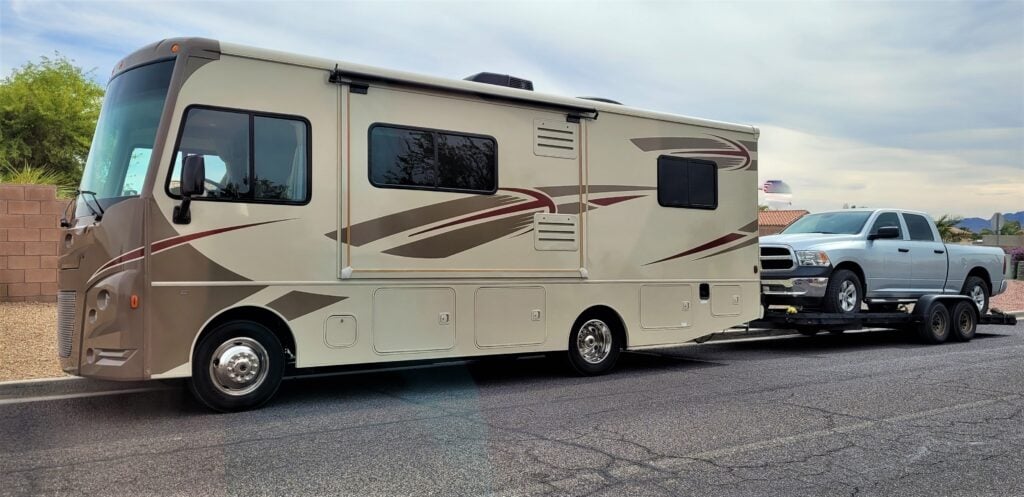In the past, recreational vehicles were frequently thought of and used for recreational purposes, thus the name. Of course, they would take insurance out on their cars, but not on the lifestyle itself. But people have started using their RVs more consistently. Some are even living in them, making full-time RV insurance a much more attractive option. Is it something you should be using for your RV? Let’s dive in to find out everything you need to know.
What Is Full-Time RV Insurance?
Full-time RV insurance covers individuals who live in their rigs for six months or longer. Progressive Insurance states that full-time RV Insurance covers “liabilities, injuries, and certain losses that occur around your RV.” In essence, full-time RV insurance is like home insurance for people who live in their RVs for most of the year.
It’s important to note that your part-time recreational vehicle insurance coverage won’t cover everything full-time RVers will need. It has a broader coverage area and includes personal liability, medical payments, and loss assessments.
Who Offers Full-Time RV Insurance?
Most major insurance companies offer RV insurance. However, full-time recreational vehicle coverage may be more challenging to find. A quick google search will bring up many different options, including Good Sam, Progressive, National General, and RVInsurance.com.
Good Sam is always a great option for RVers, as they’re immersed in the industry and will likely have a more extensive library of options. However, you should shop around and find the best rates and coverage options for you.

How Much Is Full-Time RV Insurance?
Many factors affect the price of your policy, but you can expect to pay around $1,000 to $2,000 a year.
Rates depend on deductibles, coverage, and any additional services you may want to include with your policy. Your RV’s price, class, age, size, model, mileage, and additional features can also affect rates.
What Kind of Coverage You Can Expect with a Full-Time RV Insurance Policy
There are several options, including personal liability, personal belongings coverage, and medical payments to others. Let’s take a deeper look into these three options.
Personal Liability
Similar to automobile insurance, RV personal liability insurance covers you if you’re at fault in an accident with your RV. More specifically, it covers property damage and loss and personal injuries in or around your RV.
Typically, all RVs with a motor (Class A and Class B motorhomes) require personal liability insurance. However, personal liability insurance is still available for other RV classes.
Personal Belongings Coverage
While you can compare personal liability coverage to automobile insurance, personal belongings coverage is more like home or renter’s insurance. It ensures the items inside your RV, such as furnishings or belongings. It also protects property inside your RV from theft or damage.
Medical Payments to Others
In the case of an accident, good RV insurance will not only cover your rig but also the people. In the case of an accident, your insurance company will make medical payments for you or any other individual injured in or near your RV. This can offer much-needed peace of mind when you’re on the road constantly.

Is It Hard to Get Full-Time RV Insurance?
Getting this insurance is not difficult. You can contact most insurance agencies through an online chat or website by calling the national hotline or speaking with a local agent in a branch near you. Sometimes, you’ll get answers faster over chat, but sometimes it’s easier to convey your needs over the phone. Just choose the option that’s most convenient for you.
Do All Insurers Provide Coverage for Full-Timers?
As stated before, most major insurance companies provide RV insurance, and you can customize most policies to meet your needs. However, some are better than others.
As mentioned previously, it’s wise to go with an insurance provider that understands the RV industry and can better answer your questions. But as you shop around, you might find a lesser-known company that fits your needs–it’s all about what feels right for you!
Top Tip: Get Several Quotes Before Selecting a Policy
Just like with any other coverage, when looking for good full-time RV insurance, get several quotes from different companies. When buying a house, wouldn’t you want to get multiple loan offers to find which one has the best price or interest? It’s the same with insurance. Each company may offer different rates, deductibles, and provide different types of coverage. Getting multiple quotes helps you find the company and coverage that’s best suited for you.

Is Full Time RV Insurance Worth It?
For people traveling full-time, this policy is a no-brainer. Many states require basic liability insurance for any unit with a motor. But for full-timers, your RV is your home. You need to protect your home so you can continue enjoying your fabulous adventures.

Leave a Reply